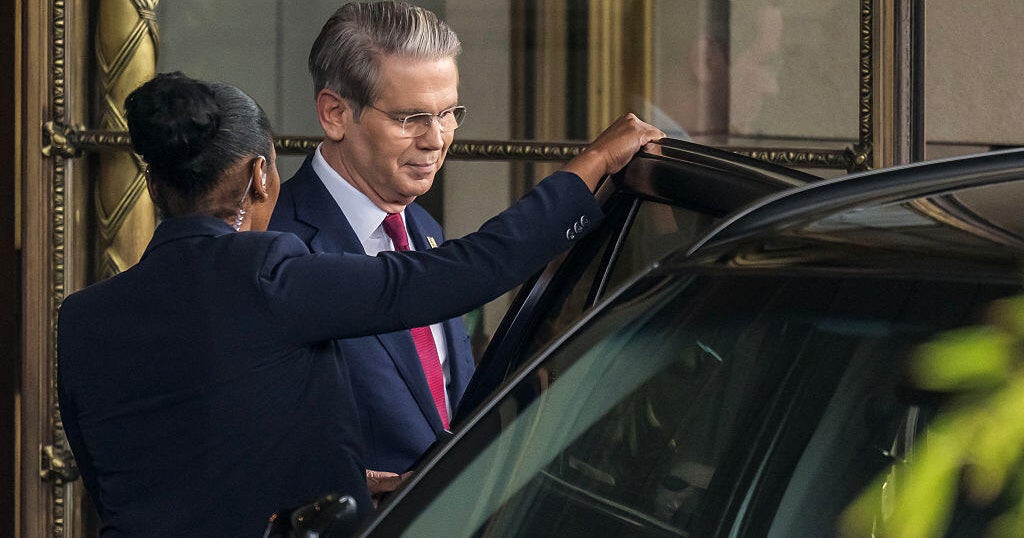Sensitive talks between U.S. and Chinese delegations over tariffs that threaten to upend the global economy ended after a day of prolonged negotiations and will resume Sunday, a source briefed on the meetings confirmed to CBS News.
There was no immediate indication whether any progress was made Saturday during the more than 10-hour meeting between Treasury Secretary Scott Bessent and Chinese Vice Premier He Lifeng in Switzerland. The talks, which could help stabilize world markets roiled by the U.S.-China standoff, have been shrouded in secrecy and neither side made comments to reporters on the way out.
Based on Bessent's interview with Fox News last week, initial discussions were likely about "de-escalation, not about the big trade deal." The Treasury secretary said the U.S. and China have "shared interests" because the sky-high tariffs imposed by both countries last month are not "sustainable."
U.S. Trade Representative Jamieson Greer is also in Switzerland alongside Bessent for the talks.
Several convoys of black vehicles left the residence of the Swiss ambassador to the U.N. in Geneva, which hosted the talks aimed at de-escalating trade tensions between the world's two biggest economies. Diplomats from both sides also confirmed that the talks took place.
The talks were taking place in the sumptuous 18th-century "Villa Saladin" overlooking Lake Geneva. The former estate was bequeathed to the Swiss state in 1973, according to the Geneva government.
The hope is that the two countries will scale back the massive taxes — tariffs — they've slapped on each other's goods, a move that would relieve world financial markets and companies on both sides of the Pacific Ocean that depend on U.S.-China trade.
In an interview with NBC News last week, President Trump claimed Chinese officials "want to make a deal very badly. We'll see how that all turns out, but it's got to be a fair deal." The president also said he expected to lower tariffs on China "at some point."
Meanwhile, Chinese officials have said they are open to negotiating with the U.S. on trade, but pushed the Trump administration to drop its "unilateral" tariffs first.
Mr. Trump last month raised U.S. tariffs on China to a combined 145%, and China retaliated by hitting American imports with a 125% levy. Tariffs that high essentially amount to the countries' boycotting each other's products, disrupting trade that last year topped $660 billion.
Even before the talks began, Mr. Trump suggested Friday that the U.S. could lower its tariffs on China, saying in a Truth Social post that "80% Tariff seems right! Up to Scott.″
Sun Yun, director of the China program at the Stimson Center, noted it will be the first time He and Bessent have talked. She doubts the Geneva meeting will produce any substantive results.
"The best scenario is for the two sides to agree to de-escalate on the ... tariffs at the same time," she said, adding even a small reduction would send a positive signal. "It cannot just be words."
Since returning to the White House in January, Mr. Trump has aggressively used tariffs as his favorite economic weapon. He has, for example, imposed a 10% tax on imports from almost every country in the world.
But the fight with China has been the most intense. His tariffs on China include a 20% charge meant to pressure Beijing into doing more to stop the flow of the synthetic opioid fentanyl into the United States. The remaining 125% involve a dispute that dates back to Mr. Trump's first term and comes atop tariffs he levied on China back then, which means the total tariffs on some Chinese goods can exceed 145%.
During Mr. Trump's first term, the U.S. alleged that claimed China uses unfair tactics to give itself an edge in advanced technologies such as quantum computing and driverless cars. These The allegations include forcing U.S. and other foreign companies to hand over trade secrets in exchange for access to the Chinese market; using government money to subsidize domestic tech firms; and outright theft of sensitive technologies.
Those issues were never fully resolved. After nearly two years of negotiation, the United States and China reached a so-called Phase One agreement in January 2020. The U.S. agreed then not to go ahead with even higher tariffs on China, and Beijing agreed to buy more American products. The tough issues — such as China's subsidies — were left for future negotiations.
But China didn't come through with the promised purchases, partly because COVID-19 disrupted global commerce just after the Phase One truce was announced.
The fight over China's tech policy now resumes.
Mr. Trump is also agitated by America's massive trade deficit with China, which came to $263 billion last year.
In Switzerland on Friday, Bessent and Greer also met with Swiss President Karin Keller-Sutter.
Mr. Trump last month suspended plans to slap hefty 31% tariffs on Swiss goods -- more than the 20% levies he plastered on exports from European Union. For now, he's reduced those taxes to 10% but warned he could raise them again.
The government in Bern is taking a cautious approach. But it has warned of the impact on crucial Swiss industries like watches, coffee capsules, cheese and chocolate.
"An increase in trade tensions is not in Switzerland's interests. Countermeasures against U.S. tariff increases would entail costs for the Swiss economy, in particular by making imports from the USA more expensive," the government said last week, adding that the executive branch "is therefore not planning to impose any countermeasures at the present time."
On Saturday, Bessent said trade talks with Switzerland were "very productive," and he was "optimistic about the speed of these negotiations," citing Mr. Trump's trade deal with the U.K. that's still being finalized.
"I am glad that we have agreed on accelerated trade talks, and we expect that a detailed Swiss proposal will be submitted to Ambassador Greer by next week," Bessent wrote on social media. "Swiss companies have indicated their interest in investing CHF 150-200 billion in new U.S. investments thanks to President Trump's policies, and we look forward to our continued talks."
The U.S. is Switzerland's second-biggest trading partner after the European Union – the 27-member country bloc that nearly surrounds the wealthy Alpine country of more than 9 million. U.S.-Swiss trade in goods and services has quadrupled over the last two decades, the government said.
The Swiss government said Switzerland abolished all industrial tariffs on Jan. 1 last year, meaning that 99% of all goods from the United States can be imported into Switzerland duty-free.
More from CBS News





